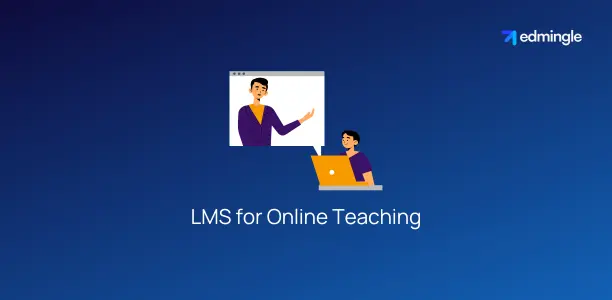
Today, digital classrooms are becoming as fundamental as traditional ones.
And in such a scenario, an LMS for online teaching; both remote and virtual, is becoming the new norm.
These platforms are redefining educational experiences, creating new standards and bridging gaps.
Its an era of endless information and technological advancement where an LMS for online teaching stands at the forefront.
But what exactly makes an LMS such a game-changer? We’ll explore that & a lot more in this blog.
What is an LMS for Online Teaching?
We know that a learning management system is a software platform designed to facilitate the delivery, management & tracking of educational courses or training programs over the internet.
Similarly, an LMS for online teaching serves as a virtual learning environment.
Here, teachers can create, store, and share educational content, conduct classes, and interact with students.
Why or how do these stand apart from other learning management systems, is described below.
Why Use an LMS for Online Teaching?
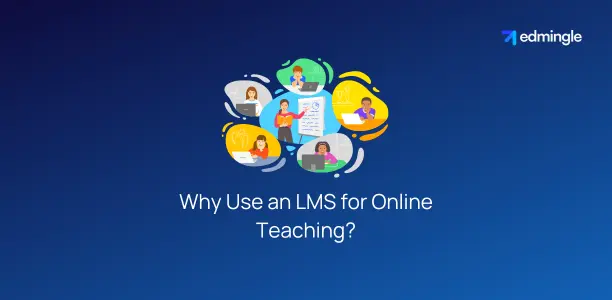
Online teaching can take various forms like; virtual training, remote learning, distance education, etc.
An LMS for online teaching aids all these models of learning apart from just selling courses. And that too, without all the unnecessary fuss.
This enables them to cater to diverse needs; of both teachers and learners.
Since the digital educational landscape is increasing at a fast pace, these platforms become necessary.
8 Benefits of an LMS for Online Teaching, Virtual and Remote Training
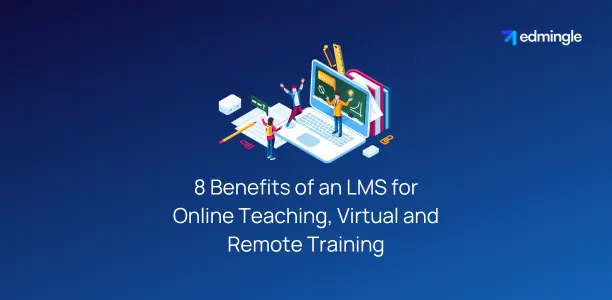
We know the benefits a learning management system brings to the table for training businesses.
But when it comes to online teaching, all the benefits boil down more specifically to cater to this unique need.
Here are the 8 benefits of an LMS for online teaching:
1.Boosts Learner Engagement
Learning management systems have revolutionized learner engagement in online teaching.
This has been achieved by incorporating interactive features like discussion forums, quizzes, and multimedia content formats.
LMS platforms are making learning more dynamic and engaging than ever before.
And today, these tools are enabling students to actively participate in their education, fostering a more connected and active learning experience.
2.Provides Flexibility in Teaching and Learning
Flexibility is a cornerstone of an LMS for online teaching.
This allows educators to structure courses that students can access at their pace, convenience, schedules and time zones.
It also empowers students while making education more accessible and tailored to individual needs.
To explore more about Edmingle’s scalability & flexibility capabilities, check our blog.
3.Centralized Content Management
Traditional teaching included a lot of printed materials. And managing everything from learning resources to assessment scores was a hefty task.
How simple it would be to store all resource, from lecture notes to scores, at one accessible location.
As both an educator & learner, you can do it seamlessly with an LMS for online teaching.
This streamlines the learning process, ensuring that students have easy and consistent access to all their course materials.
4.Security, Data Protection and Ownership
With everything going online, security, data protection & ownership become paramount.
Modern solutions come equipped with robust LMS security features/measures to protect sensitive data.
This includes course content encryption, secure login processes & data backup systems, ensuring that both educators’ and students’ information remains confidential and safe.
Furthermore, ownership becomes a crucial factor. As most online course marketplaces offer limited ownership on content and learner data.
5.Integrated Communication Tools
Traditional face-to-face learning is considered highly authentic because of one reason; flawless communication & understanding.
Most of the times, this is where online learning lags behind. But now with an LMS in place.
Today, LMS platforms offer a variety of integrated communication tools. These include email, chat functions, and discussion boards.
By facilitating seamless interaction between students and educators, this connectivity enhances the learning experience and helps build a supportive online community.
6.Scalability
Scalability is a significant advantage of LMS platforms. It won’t be long for your learner base to grow from 10 to 10,000.
These platforms can, generally, easily accommodate an increasing number of students and courses.
This scalability ensures that educational institutions can grow and adapt without compromising on quality.
7.Learning Without Pressure
In an online setting, LMS platforms promote a pressure-free learning environment. Thanks to options like self-paced learning & instructor-led training.
Students can now progress through courses without the stress of traditional deadlines and curriculum pacing.
This relaxed approach can improve understanding and learner retention. Thereby, fostering a more positive learning experience.
8.Real Time Tracking, Reporting and Analytics
Finally, LMS platforms offer real-time tracking, reporting & analytical tools.
Educators can monitor student progress, attendance, and engagement. This helps them make improvements where needed.
This tailored training strategy can offer targeted support, ensuring that every student can achieve their full potential.
9 Core Features of an LMS for Online Teaching
It’s a digital era. Where, remote education, virtual & distance learning are becoming increasingly prevalent.
The role of a learning management system is more critical than ever. An effective LMS is the backbone of successful online teaching.
And identifying one will make for an indispensable tool. Here are the 9 core features of an LMS for online teaching:
| 1. Course Creation and Management | An LMS should allow educators to easily create, organize, and manage courses, materials & assessments. The ability to update and modify learning content as needed ensures that courses remain relevant and up-to-date. |
| 2. Interactive Learning Tools | To engage students in a virtual setting, LMS platforms must incorporate interactive tools such as discussion forums, wikis, and blogs. These tools encourage active participation and collaboration among students, simulating a classroom-like environment in the digital space. |
| 3. Multimedia Integration | A modern LMS supports a range of multimedia content, including videos, podcasts, and infographics. This diversity in learning materials caters to different learning styles, enhancing the overall educational experience. |
| 4. Customizable Learning Paths | One of the strengths of an LMS is the ability to create personalized learning paths for students. This feature allows educators to tailor the learning experience to individual student needs, accommodating different learning speeds and styles. |
| 5. Assessment and Feedback | Effective assessment tools are integral to an LMS. These include quizzes, assignments, and exams with various question types. An LMS not only facilitates the administration of these assessments but also streamlines the feedback process. Thereby, providing students with timely and constructive responses. |
| 6. Tracking and Reporting | A learning management system provides comprehensive tracking and reporting capabilities, enabling educators to monitor student progress, engagement, and performance. This data is crucial for identifying areas where students may need additional support or resources. |
| 7. Mobile Accessibility | With the increasing use of smartphones and tablets, mobile accessibility is a must-have feature in an LMS. Mobile learning aids learners in accessing learning materials and courses at anytime, from anywhere, breaking down geographical and time barriers. |
| 8. Seamless Integration | A good LMS seamlessly integrates with other tools and platforms, such as video conferencing tools, email systems, HRS & CRM. This integration ensures a smooth and cohesive learning experience for both students and educators. |
| 9. Security and Data Privacy | In the online realm, security and data privacy are paramount. A robust LMS will have strong security measures in place to protect sensitive educational data and ensure compliance with data protection laws. |
By incorporating these core features, an LMS transforms into a comprehensive, interactive, and adaptable learning environment.
To know in detail about all the learning management system features, check our blog.
8 Step Guide to Effectively Conduct Online Classes with an LMS
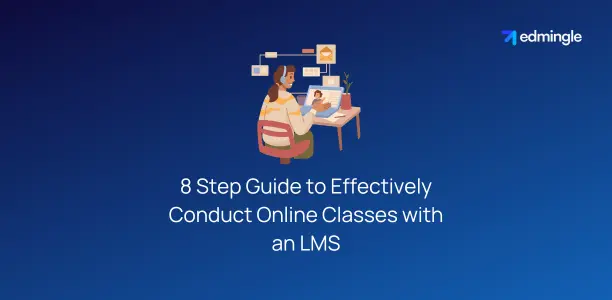
Conducting online classes with an LMS (learning management system) involves several key steps. Each focused on leveraging the capabilities of the LMS.
In order to create an effective and engaging online learning experience, follow these steps:
- Course Preparation: Start by setting up your course structure within the LMS. Upload your syllabus & course materials. Organize these resources into modules or weeks for easy navigation.
- Create Interactive Content: Utilize the LMS tools to make your learning content interactive. Add multimedia content like videos, create discussion forums, and use built-in quiz functionalities.
- Schedule Classes: If your LMS includes a scheduling feature, set up your live class sessions. This might involve integrating with video conferencing tools that are either part of the LMS or can be added on.
- Communicate with Students: Use the LMS’s communication tools to send notifications, announcements, course updates, and individual feedback. Consistent communication along with social learning is key in an online environment.
- Assignments and Assessments: Assign and collect homework and projects through the LMS. Utilize online exams for assessments, take advantage of features like automatic grading and time limits.
- Track Student Progress: Monitor student engagement and progress using the LMS’s analytics and reporting tools. This can help in identifying students who might need extra help.
- Feedback and Improvement: Collect feedback from students about their learning experience. Use this feedback to make adjustments to your teaching methods or course content.
- Continuous Engagement: Keep students engaged throughout the course with regular updates, interactive discussions, and timely feedback on their work.
By following these steps, educators can effectively utilize an LMS to conduct online classes.
All while ensuring a structured, interactive, and supportive learning environment for their students.
20 Best LMS for Online Teaching in 2024

It’s 2024. There are plenty of options for almost everything available in the market out there.
And amidst this, selecting the right learning management system (LMS) becomes a little challenging.
But fret not. We’ve compiled this list of the 20 best LMS platforms that stand out in delivering an exceptional online teaching and learning experience.
1.Edmingle
Edmingle is a robust SaaS LMS platform known for its easy to use & navigate interface, wide range of features & integrations. It’s focused on helping training businesses build, manage and scale their online training academies alongside delivering a world-class learning experience.
What sets it apart from other players in the market are its multi-batch & branch management features, exceptional customer support & service, 100%white-labelling and high scalability & flexibility.
It’s trusted by 5000+ training businesses across 160+ countries. This list also includes leaders like McGraw Hill, Aditya Birla Education Academy, NASSCOM Foundation, MIT SDE, LawSikho and many more.
2.TalentLMS
TalentLMS stands out for its ease of use and customization options. It offers a flexible and scalable online learning management system.
3.Google Classroom
Though not a true LMS, Google Classroom is popular for its simplicity and integration with Google’s suite of tools. With a video conferencing tool like Zoom, it does the basic job pretty well.
4.Thinkific
Thinkific excels in providing educators with the tools to create and market their online courses. It’s particularly suited for independent instructors and organizations.
5.Canvas
Canvas is renowned for its robust features and adaptability. Its intuitive design and comprehensive set of tools make it a top choice.
6.Schoology
Schoology combines learning management with assessment management, offering a collaborative and interactive learning experience. It’s a well-suited LMS for K-12 schools and higher education institutions.
7.Academy Of Mine
AOM specializes in offering customizable e-learning solutions. With its focus on professional development and certification courses, it’s a great option.
8.Moodle
Moodle, an open-source LMS, is highly customizable and widely used. Moodle is perfect for those looking for a flexible and customizable platform.
9.LRN
LRN is known for its user-friendly design and effective course management capabilities. It’s a good fit for organizations focusing on compliance training and skill development.
10.eFront
eFront stands out for its enterprise-level functionality and advanced LMS security features. It’s ideal for large organizations needing a robust and scalable LMS solution.
11.Dokeos
Dokeos is a tailored LMS for healthcare and pharmaceutical sectors, offering specific compliance training features. It’s a go-to choice for industry-specific online training.
12.Sakai
Sakai is another open-source option preferred by many institutions for its collaborative tools and flexibility. It’s great for universities and colleges looking for a customizable LMS.
13.ATutor
ATutor is designed with inclusivity & accessibility in mind, ensuring all learners have equal access to educational materials.
14.Blackboard
Blackboard is one of the most well-known LMS platforms, offering a comprehensive set of tools for course management and virtual learning environments.
15.Latitude Learning
Latitude Learning excels in providing an LMS tailored to employee training. Its focus on business performance improvement makes it a great choice for corporate clients.
16.ILIAS
ILIAS offers a flexible and versatile LMS solution, known for its strong community support and open-source nature. It’s well-suited for both academic and corporate settings.
17.Open edX
Open edX, backed by Harvard and MIT, is an open-source LMS known for its massive open online courses (MOOCs). It’s ideal for those looking to offer or participate in large-scale online courses.
18.Hurix
Hurix specializes in digital content and mobile learning solutions. It’s an excellent choice for educators who want to incorporate mobile learning into their strategy.
19.Absorb LMS
Absorb LMS is recognized for its intuitive design and powerful automation capabilities. It’s suitable for businesses seeking an efficient and engaging employee training solution.
20.Brightspace
Brightspace by D2L is favored for its innovative approach and analytics capabilities. It’s an excellent platform for educational institutions aiming to offer a personalized and adaptive learning experience.
Each LMS on this list offers unique features and functionalities, catering to different needs in the vast landscape of online teaching.
And selecting the right one depends on your specific educational goals, target audience, and desired learning outcomes.
How to Select the Best LMS for Online Teaching?

Selecting the best LMS for online teaching might seem like a herculean task. But it isn’t.
If you have identified your needs properly, then you would just need to look for certain questions like:
- How easy is the LMS platform to use?
- Does it have the essential features & functionality that align with your needs & objectives?
- Is it scalable enough to grow with your growing needs?
- How well does it integrate with other tools and systems?
- Does the LMS provider/vendor provide quality support & training?
- Does the pricing structure fit your budget while meeting your requirements?
- Is the LMS loaded with robust security measures and complies with data privacy laws?
With these factors, you can choose an LMS that best fits your online teaching needs. All while enhancing the learning experience for your students.
For more information on LMS pricing plans, check our blog on learning management system pricing.
Conclusion
In wrapping up, we circle back to our initial premise: the growing importance of virtual classrooms in today’s educational landscape.
As we’ve explored, an LMS for online teaching is more than just an online platform. It’s a dynamic environment that redefines educational experiences.
It sets new standards in a world that is increasingly reliant on technology.
And whether you’re experienced or just beginning out, it can be a game-changer in enabling you to adapt to the evolving demands of the digital era.
FAQs on LMS for Online Teaching
1.What are the key features to look for in an LMS for effective online teaching?
When selecting an LMS for online teaching, consider essential features like user-friendly interface, content management & authoring tools, assessment and tracking tools, mobile accessibility & integration capabilities.
2.How does an LMS enhance the learning experience in online education?
An LMS enhances online education by providing a centralized and structured platform for course delivery. It enables consistency in learning, flexibility, engagement and interaction, real-time feedback & collaboration.
3.Can LMS platforms be customized for specific educational needs and if so, how?
Yes, most LMS platforms offer customization to meet specific educational needs. This can be done through custom courses, white-labelling, plugins, integrations, etc.

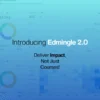




Leave a Reply